Avocados are a nutrient-dense fruit packed with healthy monounsaturated fats that support heart health. They offer significant nutritional value with vitamins, minerals, and fibre. Their creamy texture allows for versatile culinary applications, enhancing dishes from salads to smoothies. Understanding how to properly store and use avocados maximises their health benefits and flavour.
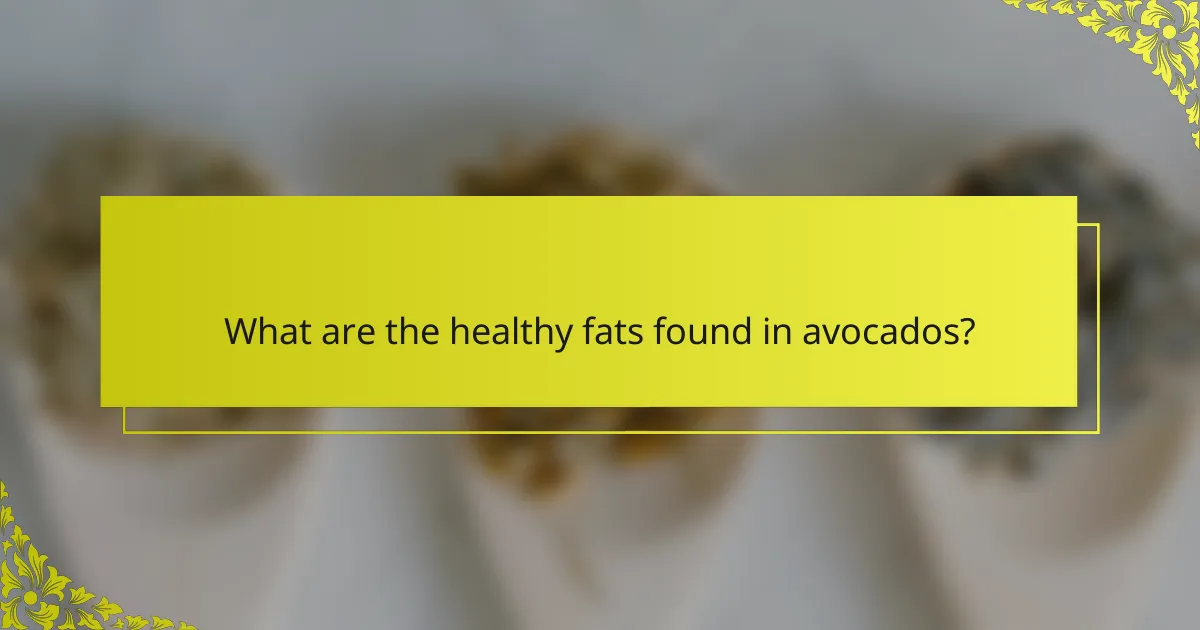
What are the healthy fats found in avocados?
Avocados contain healthy monounsaturated fats, primarily oleic acid, which supports heart health. These fats help reduce bad cholesterol levels and provide essential fatty acids. Additionally, avocados are rich in nutrients such as potassium and vitamins E and K, enhancing their overall nutritional value. Their creamy texture makes them versatile for various culinary applications, from salads to spreads.
How do monounsaturated fats benefit heart health?
Monounsaturated fats, found abundantly in avocados, significantly benefit heart health by lowering bad cholesterol levels. These fats reduce the risk of heart disease and improve overall cardiovascular function. Research indicates that diets rich in monounsaturated fats can enhance heart health markers, such as blood pressure and inflammation. Including avocados in meals provides a delicious way to incorporate these healthy fats, promoting a heart-healthy lifestyle.
What role do polyunsaturated fats play in nutrition?
Polyunsaturated fats are essential for nutrition, providing heart health benefits and supporting brain function. Avocados are rich in these healthy fats, specifically omega-3 and omega-6 fatty acids, which reduce inflammation and improve cholesterol levels. Incorporating avocados into meals enhances nutrient absorption and promotes overall well-being.
Are there any saturated fats in avocados?
Yes, avocados contain saturated fats, but in moderate amounts. Approximately 2 grams of saturated fat are present in a typical avocado, which is significantly lower compared to other sources of saturated fats like butter or fatty meats. The majority of fats in avocados are monounsaturated, contributing to their health benefits, such as improved heart health and reduced inflammation.
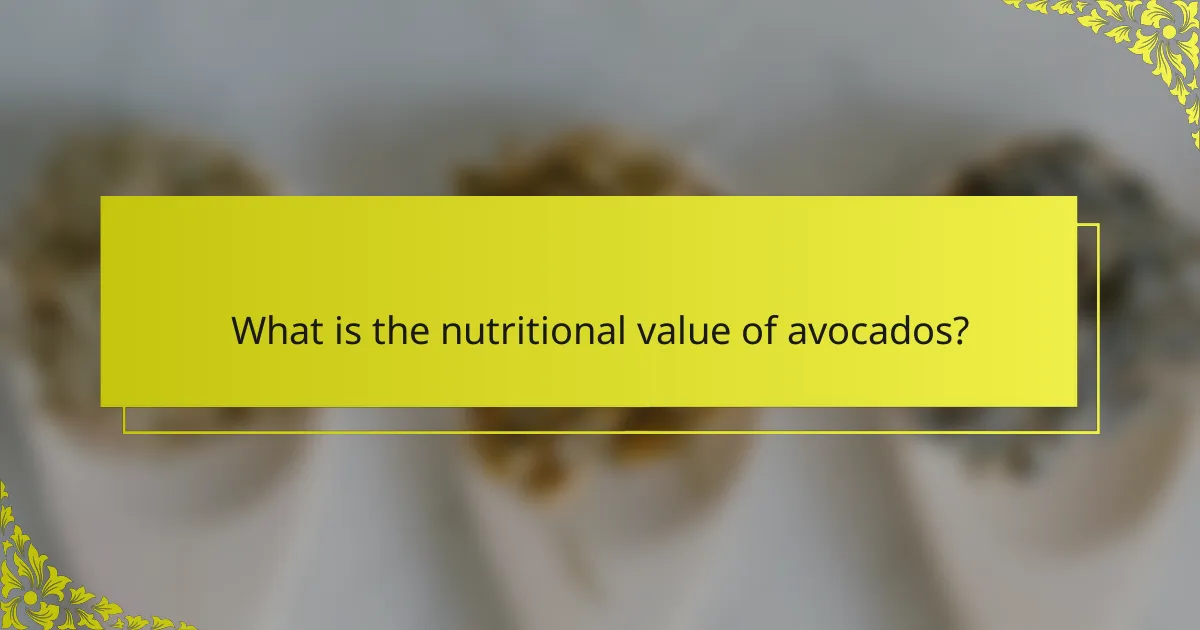
What is the nutritional value of avocados?
Avocados are nutrient-dense fruits rich in healthy fats, vitamins, and minerals. They contain approximately 160 calories, 15 grams of fat, and provide significant amounts of potassium, fibre, and vitamins E, K, and B6. The unique attribute of avocados is their high monounsaturated fat content, which supports heart health.
How do avocados compare to other fruits in terms of calories?
Avocados are relatively low in calories compared to many other fruits. A typical avocado contains about 160 calories per 100 grams, while fruits like bananas and grapes can have around 89 and 69 calories per 100 grams, respectively. This unique caloric density, combined with healthy fats, makes avocados a nutritious choice among fruits.
| Fruit | Calories per 100g |
|————|——————–|
| Avocado | 160 |
| Banana | 89 |
| Grapes | 69 |
| Apple | 52 |
| Orange | 47 |
| Strawberry | 32 |
What vitamins and minerals are abundant in avocados?
Avocados are rich in vitamins and minerals, particularly vitamin K, vitamin E, vitamin C, and various B vitamins like B5, B6, and folate. They also contain potassium, which supports heart health. These nutrients contribute to the unique health benefits of avocados, including their role in reducing inflammation and promoting nutrient absorption.
What is the fibre content of avocados?
Avocados contain approximately 7 grams of fibre per 100 grams. This high fibre content contributes to digestive health and helps regulate blood sugar levels. The fibre in avocados is primarily soluble, which aids in lowering cholesterol.

What unique attributes make avocados stand out?
Avocados are unique due to their high monounsaturated fat content, specifically oleic acid, which supports heart health. They also provide a rare combination of fibre, vitamins E, K, and B, along with potassium. Additionally, avocados contain unique phytonutrients like lutein and zeaxanthin, which promote eye health. Their creamy texture and versatility in culinary applications further set them apart, making them a popular choice in various dishes.
How does the creamy texture of avocados enhance dishes?
The creamy texture of avocados enhances dishes by adding richness and depth. This unique attribute allows avocados to act as a natural emulsifier, improving the overall mouthfeel of recipes. For example, they can transform smoothies into a velvety blend and elevate salads with a luxurious creaminess. Additionally, avocados are a source of healthy monounsaturated fats, which contribute to heart health. Their versatility makes them suitable for both savoury and sweet applications, enriching flavours and textures across various cuisines.
What antioxidants are present in avocados?
Avocados contain several antioxidants, including lutein, zeaxanthin, and tocopherols. These compounds contribute to eye health and may reduce oxidative stress. Lutein and zeaxanthin are particularly significant as they help filter harmful blue light. Additionally, avocados provide vitamin E, which is known for its antioxidant properties.
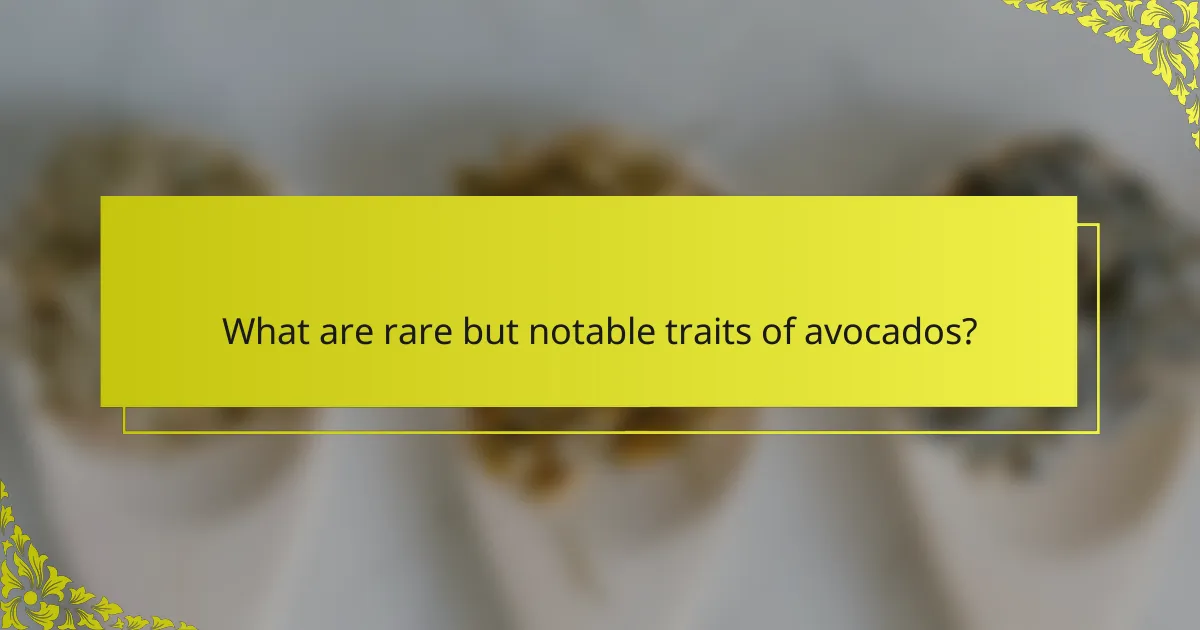
What are rare but notable traits of avocados?
Avocados possess rare but notable traits that enhance their appeal. One unique attribute is their high oleic acid content, which promotes heart health. Additionally, avocados contain lutein and zeaxanthin, antioxidants that support eye health. Another rare trait is their ability to ripen after being harvested, allowing for better storage and transportation. Finally, avocados are one of the few fruits that contain monounsaturated fats, contributing to their nutritional value.
How do avocados contribute to skin health?
Avocados significantly enhance skin health due to their rich content of healthy fats and vitamins. They contain monounsaturated fats, which help maintain skin hydration and elasticity. Additionally, avocados are high in vitamins E and C, both of which are antioxidants that protect the skin from oxidative stress. The unique attribute of avocados is their ability to promote collagen synthesis, which is essential for skin structure and firmness. Regular consumption can lead to improved skin texture and a radiant complexion.
What unique flavour profiles do different avocado varieties offer?
Different avocado varieties offer distinct flavour profiles, ranging from creamy and buttery to nutty and sweet. For example, Hass avocados are known for their rich, creamy texture and nutty flavour, while Fuerte avocados are milder and slightly sweet. Bacon avocados provide a light, buttery taste, and Zutano avocados have a more watery texture with a subtle flavour. These unique flavours enhance various culinary applications, making avocados versatile in dishes.
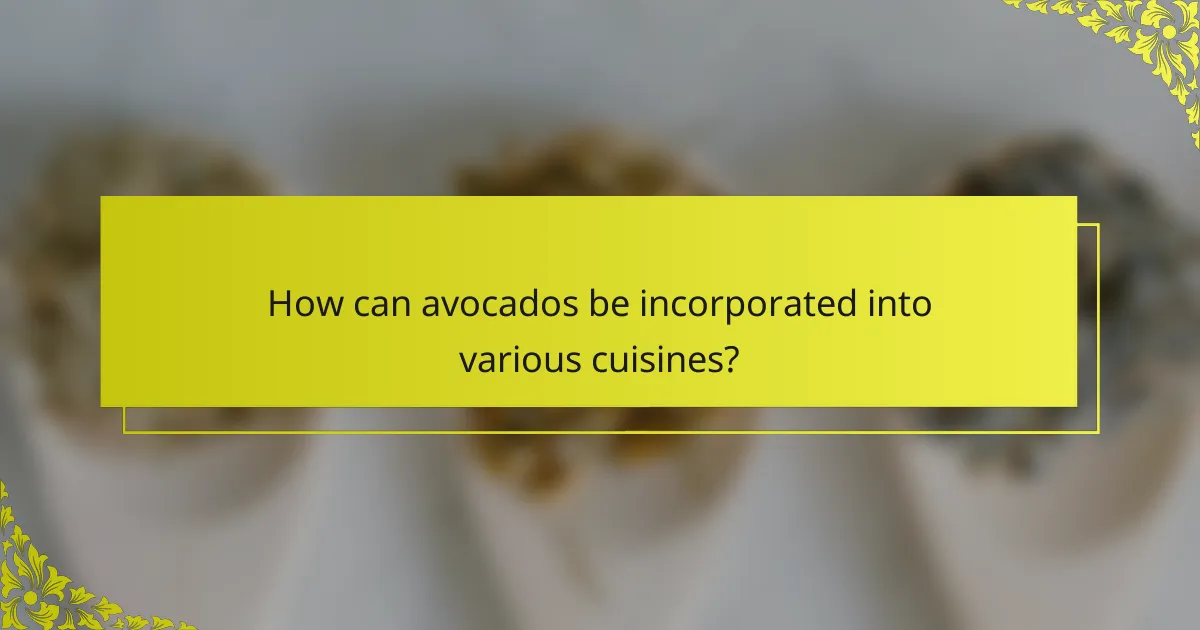
How can avocados be incorporated into various cuisines?
Avocados can be incorporated into various cuisines through diverse applications. They serve as a creamy base for dips, such as guacamole, and enhance salads with their healthy fats. In Mexican dishes, avocados add richness to tacos and burritos. They can also be blended into smoothies for added nutrition. In Mediterranean cuisine, avocados complement dishes like hummus and can be drizzled with olive oil. Unique to Asian cuisine, avocados are often featured in sushi rolls. Their versatility allows them to be used in breakfast items, like avocado toast, as well as in desserts, providing a rare attribute of sweetness when blended.
What are popular avocado-based dishes around the world?
Avocado-based dishes are popular worldwide, showcasing the fruit’s versatility. Notable examples include guacamole from Mexico, avocado toast from the United States, and sushi rolls featuring avocado in Japan. Other dishes include the Peruvian causa, a layered potato and avocado dish, and the Brazilian avocado smoothie. Each dish highlights avocado’s creamy texture and healthy fats, making it a sought-after ingredient in various cuisines.
How can avocados be used in desserts?
Avocados can be used in desserts to create creamy textures and rich flavours. They serve as a healthy substitute for butter or cream in recipes, contributing healthy fats and nutrients. Common dessert applications include avocado chocolate mousse, avocado ice cream, and avocado brownies. These desserts benefit from avocados’ unique ability to enhance creaminess without overpowering other flavours, making them a versatile ingredient.
What are some creative avocado smoothie recipes?
Avocado smoothies are nutritious and versatile. Here are some creative recipes to try:
1. Classic Avocado Banana Smoothie: Blend avocado, banana, spinach, almond milk, and honey for a creamy texture.
2. Tropical Avocado Smoothie: Combine avocado, pineapple, coconut water, and lime juice for a refreshing drink.
3. Chocolate Avocado Smoothie: Mix avocado, cocoa powder, almond milk, and maple syrup for a dessert-like treat.
4. Green Avocado Smoothie: Blend avocado, kale, apple, ginger, and water for a nutrient-packed option.
5. Berry Avocado Smoothie: Combine avocado, mixed berries, yogurt, and orange juice for a fruity flavour.
What are the best practices for storing avocados?
To store avocados effectively, keep them at room temperature until they ripen, then refrigerate to extend freshness. Avoid exposure to direct sunlight, as it accelerates ripening. For optimal storage, place them in a paper bag to trap ethylene gas, which speeds up the ripening process. Once cut, sprinkle lemon juice on the flesh and wrap tightly to minimise browning.
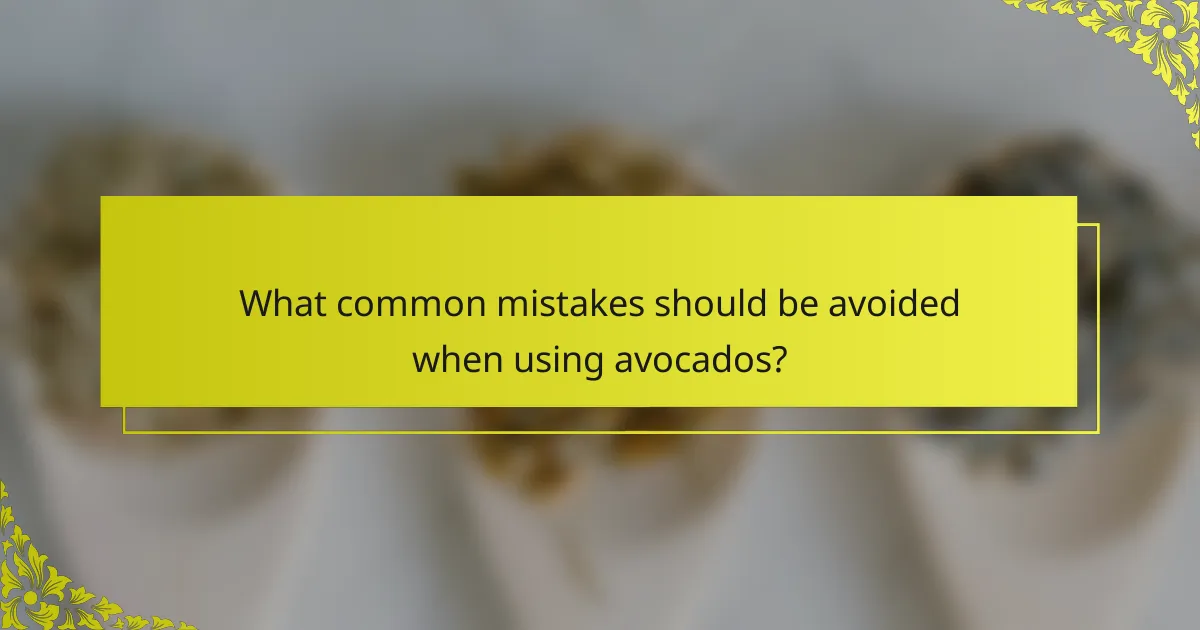
What common mistakes should be avoided when using avocados?
Avoiding common mistakes when using avocados is essential for maximising their health benefits and culinary potential. One mistake is storing them improperly; avocados should be kept at room temperature until ripe, then refrigerated. Another error is cutting them too early, which can lead to a lack of flavour and texture. Over-seasoning avocados can mask their natural taste, while not using them promptly after slicing can lead to browning. Lastly, discarding the pit can waste the unique attribute of preserving freshness in the remaining fruit.
How can overripe avocados be repurposed?
Overripe avocados can be repurposed into various delicious and nutritious forms. They can be transformed into guacamole, used in smoothies for creaminess, or incorporated into baked goods like brownies for added moisture. Additionally, overripe avocados can serve as a base for salad dressings or spreads, enhancing flavour and nutritional value.
What are the signs of a good avocado to select?
A good avocado should be dark green to black in colour, slightly soft to the touch, and free from blemishes. Look for a smooth skin and a firm but yielding texture when gently squeezed. The stem end should be intact and green, indicating freshness. Avoid avocados with large indentations or overly soft spots, as these may indicate overripeness or spoilage.
How to prevent avocados from browning after cutting?
To prevent avocados from browning after cutting, apply lemon juice or vinegar to the exposed flesh. These acidic substances slow down oxidation, preserving the avocado’s vibrant colour. Store the avocado in an airtight container or wrap it tightly with plastic wrap to minimise air exposure. Another effective method is to keep the pit in the unused half, as it can help reduce browning.
What are expert insights on maximizing avocado health benefits?
To maximise avocado health benefits, focus on consuming them with complementary foods and in appropriate portions. Pairing avocados with high-fibre foods enhances nutrient absorption. The healthy fats in avocados improve the bioavailability of fat-soluble vitamins like A, D, E, and K. Aim for half an avocado daily to reap benefits without excessive calorie intake.




